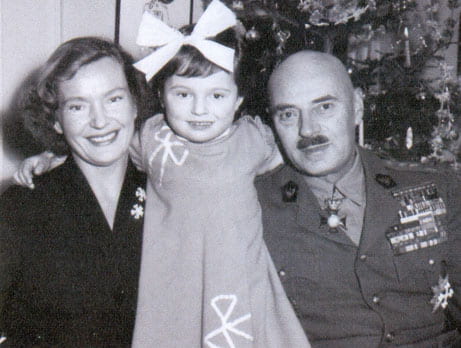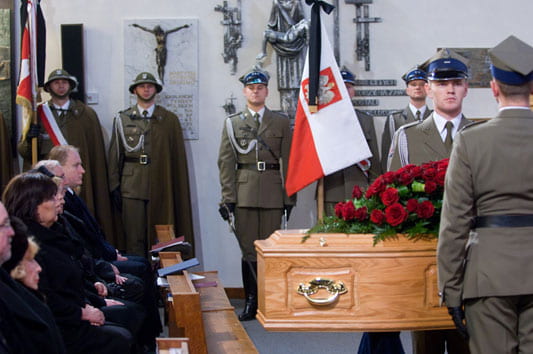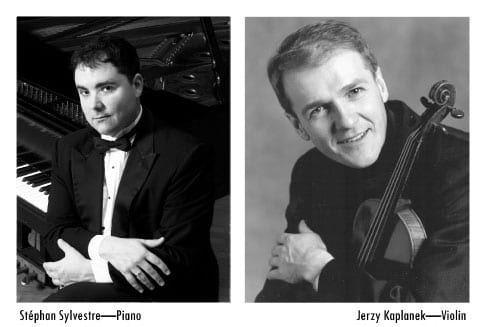Polish Music Newsletter Vol. 17, no. 1
2010: Year in Review
Anniversaries
 By unanimous vote of the Polish Parliament, 2010 was designated the year of Fryderyk Chopin and the 200th anniversary of the birth of this extraordinary composer and pianist was celebrated throughout the world all year long.
By unanimous vote of the Polish Parliament, 2010 was designated the year of Fryderyk Chopin and the 200th anniversary of the birth of this extraordinary composer and pianist was celebrated throughout the world all year long.
2010 also marked the 150th birth anniversary of Ignacy Jan Paderewski—pianist, composer, statesman and humanitarian—and celebrations took place throughout California, the U.S., Poland, and the world.
 The centenary of the birth of Roman Maciejewski(1910-1998) was celebrated with performances of his Requiem: Missa pro defunctis at Westminster Cathedral (BBC Symphony Orchestra, Feb 4), Kraków Philharmonic (Nov 13), Warsaw Philharmonic (Dec 10-11) and a recording of the work by Polish Radio (PNCD039A/B); a premiere of his Trzy Pieśni Bilitis[Songs of Bilitis] in Poznań on March 16; and a premiere of Maski Władzy, the monodramabased on his film music, on May 7 at the Poznań Opera.
The centenary of the birth of Roman Maciejewski(1910-1998) was celebrated with performances of his Requiem: Missa pro defunctis at Westminster Cathedral (BBC Symphony Orchestra, Feb 4), Kraków Philharmonic (Nov 13), Warsaw Philharmonic (Dec 10-11) and a recording of the work by Polish Radio (PNCD039A/B); a premiere of his Trzy Pieśni Bilitis[Songs of Bilitis] in Poznań on March 16; and a premiere of Maski Władzy, the monodramabased on his film music, on May 7 at the Poznań Opera.
The I. J. Paderewski Music Academy in Poznań celebrated its 90th anniversary with twenty distinctive concerts.
The Stanisław Moniuszko Grand Theater turned 100 years old and, in celebration, Oscar-winning composer Jan A. P. Kaczmarek wrote a new gong tone to alert audiences.
In celebration of the 100th anniversary of his birth, the premiere Polish composer Stefan Themerson’s only opera—Święty Franciszek i wilk z Gubbio [St. Francis and the Wolf from Gubbio]—was presented on April 7 at the Grand Theater in Poznań.
The Adam Mickiewicz Institute celebrated its 10th anniversary with a 2-day festival of musicians and artists who promote Poland through their art.
The small city of Szczecinek in the Pomeranian region celebrated its 700th Anniversary on June 22 with the premiere of Rhythmi urbani, an oratorio based on a poem that was used by Polish and German officials that jointly administered Szczecinek in the past, by Krzesimir Dębski
 Katowice’s National Polish Radio Symphony Orchestra (NOSPR) celebrates 75 years of existence during the 2010/2011 season, inaugurated on Oct 1 with a world premiere Chopin’s Prelude in C-sharp minor Op. 45 in an orchestral arrangement by Charles Bodman Rae.
Katowice’s National Polish Radio Symphony Orchestra (NOSPR) celebrates 75 years of existence during the 2010/2011 season, inaugurated on Oct 1 with a world premiere Chopin’s Prelude in C-sharp minor Op. 45 in an orchestral arrangement by Charles Bodman Rae.
 Sting performed with the Polish Radio Orchestra on Dec 17 in Warsaw’s Polish Theatre at a concert marking the 85th anniversary of the founding of Polskie Radio, Poland’s national radio service.
Sting performed with the Polish Radio Orchestra on Dec 17 in Warsaw’s Polish Theatre at a concert marking the 85th anniversary of the founding of Polskie Radio, Poland’s national radio service.
Awards & Honors
Polish pianist Krystian Zimerman was awarded the Gloria Artis Gold Medal of Cultural Merit after giving an all-Chopin recital at Teatro La Scala in Milan, Italy on Feb 1.
Claire Huangci (19) from Lansdale, PA won the 8th US National Chopin Piano Competition in Miami on Feb 28.
 Magdalena Wor, mezzo-soprano, won First Prize in the 2010 Kosciuszko Foundation Sembrich Voice Scholarship Competition in New York City.
Magdalena Wor, mezzo-soprano, won First Prize in the 2010 Kosciuszko Foundation Sembrich Voice Scholarship Competition in New York City.
Polish composer and percussionist Marta Ptaszyńska (at right) received the John Simon Guggenheim Memorial Foundation Award in the Creative Arts – Music Composition category for 2010.
The Maria Fołtyn Grand Prix of the 7th Stanisław Moniuszko Vocal Competition in Warsaw went to Polish-born/Italian-trained soprano Eliza Kruszczyńska.
First Prize in the American Paderewski Piano Competition (APPC)—presented by the Paderewski Music Society in Los Angeles—went to Piotr Kosinski (21, Poland)
 Four albums released by DUX Records were honored with Orphée d’Or [Golden Orpheus] Awards of the French “Academie du Disque Lyrique”: Krzysztof Penderecki – Dzieła Chóralne (0694), Stanisław Moniuszko – Halka (0538/0539), Stanisław Moniuszko – Masses vol. 2 (0720), and Stanisław Moniuszko – Flis (0736).
Four albums released by DUX Records were honored with Orphée d’Or [Golden Orpheus] Awards of the French “Academie du Disque Lyrique”: Krzysztof Penderecki – Dzieła Chóralne (0694), Stanisław Moniuszko – Halka (0538/0539), Stanisław Moniuszko – Masses vol. 2 (0720), and Stanisław Moniuszko – Flis (0736).
On May 24—“The Day of the Singer”—Bronze Gloria Artis Medals were awarded to the following vocalists: Joanna Cortés, Piotr Nowacki, Krystyna Starościk-Labuda, Alina Wieczorek-Januszewska and Jolanta Gzella
The Music Academy in Bydgoszcz honored Prof. Mieczysław Tomaszewski, outstanding Chopin scholar and head of the Department of Musical Work Theory and Interpretation at the Music Academy in Kraków, with a honoris causa doctorate. Read more in the June Newsletter.
 The Annual Award of MKiDN (Doroczna Nagroda Ministra) was presented by Cultural Minister Bogdan Zdrojewski on June 14 to: pianist Piotr Anderszewski, soprano Aleksandra Kurzak, opera director Krzysztof Warlikowski, and jazz trumpeter Tomasz Stańko (lifetime achievement – pictured at right with Min. Zdrojewski)
The Annual Award of MKiDN (Doroczna Nagroda Ministra) was presented by Cultural Minister Bogdan Zdrojewski on June 14 to: pianist Piotr Anderszewski, soprano Aleksandra Kurzak, opera director Krzysztof Warlikowski, and jazz trumpeter Tomasz Stańko (lifetime achievement – pictured at right with Min. Zdrojewski)
[Photo: mkidn.gov.pl]
On June 30, the Polish Composers’ Union [ZKP] announced this year’s winners of its annual prize: composer Magdalena Długosz, musicologist Barbara Przybyszewska-Jamińska, and compser Jan Fotek (lifetime achievement)
First Prize winner in this year’s Tadeusz Baird Competition for Young Composers was Ignace Zalewski – Zutibure muzyka słowiańskiego lasu for percussion and two pianos
 The 2010 Peabody Mason International Piano Competition featured an all-Chopin program, and the Grand Prize went to Tsotne Tsotshalashvili
The 2010 Peabody Mason International Piano Competition featured an all-Chopin program, and the Grand Prize went to Tsotne Tsotshalashvili
Janusz “Ptaszyn” Wróblewski—ground-breaking Polish jazz composer and saxophonist—was awarded the Jazz Lamb Statuette Festival Award at the 15th Annual Summer Jazz Festival at the Piwnica pod Baranami on July 4.
The Main Prize of the 8th Tadeusz Ochlewski Composition Competition went to Magnetismo by Kamil Krzysztof Kosecki (b. 1984) on Sept 1.
The 2010 Cyprian Kamil Norwid Prize in music was awarded to Maestros Antoni Wit(Lifetime Achievement) and Henryk Wojnarowski (for recordings of Moniuszko’s Masses, DUX 0657 / 0720) on Sept 27.
 On Oct 21, professor Jan Ekier (right) and composer Henryk Mikołaj Górecki received the Order of the White Eagle from Polish President Poland Bronisław Komorowski, in recognition of their service to Polish culture.
On Oct 21, professor Jan Ekier (right) and composer Henryk Mikołaj Górecki received the Order of the White Eagle from Polish President Poland Bronisław Komorowski, in recognition of their service to Polish culture.
 Yulianna Avdeeva (left) was awarded the Grand Prize of the 16th International Chopin Competition in Warsaw on Oct 21. The Chopin Express newspaper provided daily, bilingual updates during this year’s anniversary edition of the prestigious competition
Yulianna Avdeeva (left) was awarded the Grand Prize of the 16th International Chopin Competition in Warsaw on Oct 21. The Chopin Express newspaper provided daily, bilingual updates during this year’s anniversary edition of the prestigious competition
[Photo: newshopper.sulekha.com]
Eduard Kunz won First Prize at the VIII International Paderewski Piano Competition in Bydgoszcz on Nov 21.
Festivals
Based in Kraków, the Unsound Festival held its first ever North American edition from Feb 4-14 in venues around New York City
 The 25th anniversary edition of the Schleswig-Holstein Musik Festival (June 23 – August 29) was dedicated to Poland. Entitled “Poland in Pulse,” it took audiences on a journey of discovery through the Polish musical landscape, and featured many of Poland’s best artists and ensembles
The 25th anniversary edition of the Schleswig-Holstein Musik Festival (June 23 – August 29) was dedicated to Poland. Entitled “Poland in Pulse,” it took audiences on a journey of discovery through the Polish musical landscape, and featured many of Poland’s best artists and ensembles
Entitled Wall to Wall Behind the Wall, the annual “Wall to Wall” marathon of New York’s Symphony Space showcased the wealth of music composed in Central and Eastern Europe from the end of WWI until the fall of Communism.
 The 53rd ‘Warsaw Autumn’ Int’l Festival of Contemporary Music [Warszawska Jesień], (September 17-25) featured a ‘keyboard’ theme during this Chopin Year, and hosted world premieres by Zygmunt Krauze, Paweł Szymański, Włodzimierz Kotoński, Marcin Bortnowski, Marcin Stańczyk, Jarosław Kapuściński, Agata Zubel, Hanna Kulenty, Lidia Zielińska, Wojciech Ziemowit Zych, and Jerzy Kornowicz. Read a review in the Oct Newsletter
The 53rd ‘Warsaw Autumn’ Int’l Festival of Contemporary Music [Warszawska Jesień], (September 17-25) featured a ‘keyboard’ theme during this Chopin Year, and hosted world premieres by Zygmunt Krauze, Paweł Szymański, Włodzimierz Kotoński, Marcin Bortnowski, Marcin Stańczyk, Jarosław Kapuściński, Agata Zubel, Hanna Kulenty, Lidia Zielińska, Wojciech Ziemowit Zych, and Jerzy Kornowicz. Read a review in the Oct Newsletter
The Baltic Sea Festival “Östersjöfestivalen”—Scandinavia’s biggest classical music festival—put Chopin in the spotlight on August 27.
Tenor Piotr Beczała, soprano Aleksandra Kurzak and pianist Krystian Zimerman all performed at this year’s edition of the prestigious Salzburg Festival in Vienna.
 The Sacrum Profanum Festival (September 12-18, Kraków) featured 7 outstanding Polish/Nordic composer combinations: Witold Lutosławski/Magnus Lindberg, Henryk Mikołaj Górecki/Klas Torstensson, Pawel Mykietyn/Anders Hillborg, Paweł Szymański/Pelle Gudmundsen-Holmgreen, Krzysztof Penderecki/Kaija Saariaho, Agata Zubel/Rolf Wallin, and Kazimierz Serocki/Hans Abrahamsen, and created Made in Poland – a Collection of Polish Music.
The Sacrum Profanum Festival (September 12-18, Kraków) featured 7 outstanding Polish/Nordic composer combinations: Witold Lutosławski/Magnus Lindberg, Henryk Mikołaj Górecki/Klas Torstensson, Pawel Mykietyn/Anders Hillborg, Paweł Szymański/Pelle Gudmundsen-Holmgreen, Krzysztof Penderecki/Kaija Saariaho, Agata Zubel/Rolf Wallin, and Kazimierz Serocki/Hans Abrahamsen, and created Made in Poland – a Collection of Polish Music.
The theme of this year’s 48th Music Festival in Bydgoszcz (Sept. 10 – Oct. 3) was “Chopin – Paderewski: World Artists,” featuring K. Penderecki and many other leading Polish musicians.
The 6th Annual Festival of Polish Music—Poland’s biggest classical music festival devoted entirely to the works of Polish composers—took place in Kraków from Nov 5-11.
During the 2010 Composers’ Portraits Festival, world premieres of Advection for chamber orchestra (2010) by Tomasz Opałka and Syrinx śląska for flutists (1987/2009) and Bischenfor flute and bass (2000) by were presented on Dec 9.
News
The Kosciuszko Foundation, based in New York and Warsaw, announced that it acquired the National Polish Center (NPC) in Washington D.C.
 The restored and modernized Frederic Chopin Museum was re-opened at the Ostrogski Castle in Warsaw. The Museum collection boasts over 5 thousand items, including manuscripts, first prints, correspondence, memorabilia, documents and important editions of Chopin’s works.
The restored and modernized Frederic Chopin Museum was re-opened at the Ostrogski Castle in Warsaw. The Museum collection boasts over 5 thousand items, including manuscripts, first prints, correspondence, memorabilia, documents and important editions of Chopin’s works.
A photo exhibit entitled “All That Jazz” by Ryszard Horowitz, one of the youngest known survivors of the concentration camp of Auschwitz and a pioneering photographer, was displayed in Poznań
 “New Music For New Players – Contemporary Works For Beginners”—a new, international project from the Polish Music Information Centre and ZKP promoting contemporary music repertoire for young musicians—was inaugurated at ArtMusFair 2010.
“New Music For New Players – Contemporary Works For Beginners”—a new, international project from the Polish Music Information Centre and ZKP promoting contemporary music repertoire for young musicians—was inaugurated at ArtMusFair 2010.
To combat the trend of playing the obligatory 33% Polish music, Poland’s MKiDN proposed a bill that would require radio stations to play 75% of the required Polish music during primetime hours. In other reforms, the Nat’l Broadcasting Council [Krajowa Rada Radiofonii i Telewizji] was dissolved in hopes of replacing it with a smaller, competitively chosen Boards of Directors
The new Online Museum of Lost Cultural Heritage [Muzeum Utracone] was launched during a special multimedia presentation in the Royal Castle in Warsaw on Saturday, May 15.
Re:New Music, a European project aimed at promoting contemporary music and supporting the circulation and performance of existing high quality ensemble repertoire, created the MatchMaker Database to connect musicians with new compositions.
 The Krakow Philharmonic Orchestra invited composer and vocalist Agata Zubel (right) to be their composer-in-residence for the 2010/2011 season.
The Krakow Philharmonic Orchestra invited composer and vocalist Agata Zubel (right) to be their composer-in-residence for the 2010/2011 season.
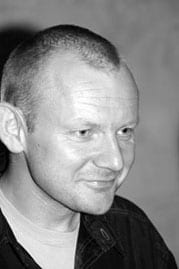 The Warsaw National Philharmonic has invited Paweł Mykietyn (left) as composer-in-residence for the 2010/2011 season and the composer is presenting a series entitled “Paweł Mykietyn zaprasza.”
The Warsaw National Philharmonic has invited Paweł Mykietyn (left) as composer-in-residence for the 2010/2011 season and the composer is presenting a series entitled “Paweł Mykietyn zaprasza.”
Although good cheer and praise abounded, not everyone was full of warm thoughts for Chopin and Paderewski this year…
Performances
 The Chopin Year was inaugurated in Warsaw with a concert featuring international superstar pianist Lang Lang. Other hightlights amongst the thousands of Chopin performances around the world included: Emanuel Ax/Yo-Yo Ma at Disney Hall; “The Longest Birthday” musical marathon in Warsaw(see left); a half-year celebration of Chopin in the UK; Ewa Pobłocka’s Chopin in D.C.; NOSPR’s Chopin in Europe and the Middle East and on a Musical Sea Voyage; Paris celebrated “Chopin l’européen” with his complete works; Maurizio Pollini’s all-Chopin recitals at Carnegie Hall; “Grazyna Auguscik’s World Sound – Chopin 200” int’l tour ; Chopin Open Festival in Warsaw; Chopin throughout Brazil; Piotr Paleczny and Sinfonia Varsovia in Paris; IPJG performs Chopin&Jazz in L.A.; and the Int’l Chopin Festival in NY
The Chopin Year was inaugurated in Warsaw with a concert featuring international superstar pianist Lang Lang. Other hightlights amongst the thousands of Chopin performances around the world included: Emanuel Ax/Yo-Yo Ma at Disney Hall; “The Longest Birthday” musical marathon in Warsaw(see left); a half-year celebration of Chopin in the UK; Ewa Pobłocka’s Chopin in D.C.; NOSPR’s Chopin in Europe and the Middle East and on a Musical Sea Voyage; Paris celebrated “Chopin l’européen” with his complete works; Maurizio Pollini’s all-Chopin recitals at Carnegie Hall; “Grazyna Auguscik’s World Sound – Chopin 200” int’l tour ; Chopin Open Festival in Warsaw; Chopin throughout Brazil; Piotr Paleczny and Sinfonia Varsovia in Paris; IPJG performs Chopin&Jazz in L.A.; and the Int’l Chopin Festival in NY
British pianist Jonathan Plowright’s celebrated Paderewski 150th anniversary with the Warsaw National Philharmonic, playing music by Paderewski, Melcer and Dobrzyński in Feb.
On March 18, conductor Yaniv Segal—son of Polish violinist Hanna Lachert—featured Penderecki’s Capriccio for Oboe and 11 Strings and Kilar’s Orawa on his Master’s recital at the University of Michigan in Ann Arbor, MI.
 Polish musician and USC graduate Karolina Naziemiec performed jazz standards and Polish songs with Sam Most, one of the first and greatest jazz flautists, on April 16th.
Polish musician and USC graduate Karolina Naziemiec performed jazz standards and Polish songs with Sam Most, one of the first and greatest jazz flautists, on April 16th.
The Yale School of Music presented “Penderecki Conducts Penderecki,” featuring the composer conducing his Threnody for the Victims of Hiroshima (1960), Symphony No. 4 (1989), Capriccio for Violin and Orchestra (1967), and Concerto for Horn and Orchestra “Winterreise” (2008).
On May 22, the U.S. National Philharmonic, conductor Piotr Gajewski and pianist Piotr Paleczny performed a program entitled “The Polish Masters & Schumann.”
 Polish-Hungarian pianist Piotr Anderszewski, who has undertaken a personal quest to shine a light on the oft-ignored music of Karol Szymanowski, created the “Szymanowski Project”—3 concerts performed at Carnegie Hall in New York in April and May. Read more here
Polish-Hungarian pianist Piotr Anderszewski, who has undertaken a personal quest to shine a light on the oft-ignored music of Karol Szymanowski, created the “Szymanowski Project”—3 concerts performed at Carnegie Hall in New York in April and May. Read more here
[Photo: Robert Workman, 2007]
 As an end to the UK’s Polska!Year, Nigel Kennedy’s Polish Weekend was held in London Centre from May 29-31, and included everything from jazz to Polish breakdancing to Chopin.
As an end to the UK’s Polska!Year, Nigel Kennedy’s Polish Weekend was held in London Centre from May 29-31, and included everything from jazz to Polish breakdancing to Chopin.
The Polish Gala at the World EXPO 2010 in Shanghai, China featured Ewa Pobłocka, laureate of the 10th International Chopin Piano Competition in Warsaw in 1980, in concert with the Zhejiang Symphony Orchestra, conducted by Krzysztof Herdzin at the Shanghai Grand Theater
Cantores Minores returned to America for the fifth time under the direction of founder and current conductor, Joseph A. Herter, for a coast-to-coast tour. Read a review here
Polish piano artist Leszek Możdżer (right) was featured at L.A.’s premiere jazz venue, the Jazz Bakery, on June 7.
Kinga Augustyn, violin, and Anna Shelest, piano, performed a recital of works by Chopin, Paderewski, Lutoslawski, and Wieniawski at the annual summer concert at the Kosciuszko Foundation – Philadelphia

On August 29, NOSPR presented an all-Górecki program: Three Pieces in the Old Style, Little Requiem for a Polka, Three Dances for Orchestra, and the Concerto for Harpsichord and Orchestra(piano version), with the composer’s daughter, Anna Górecka, at the piano.
Based on her recent recording of “Szymanowski Piano Works” (Arabesque Z6807), pianist Emily White featured Szymanowski’s Masques in New York City recital on Oct 9.
The Chopin & Paderewski 2010 committee presented An Evening of Music and Reflection in the elegant surroundings of the historic Newberry Library in Chicago, followed by the Chopin & Paderewski 2010 International Conference at Loyola University on Nov 12.
 On Nov 21, violinist Midori Goto and pianist Robert McDonald presented a recital at the Walt Disney Concert Hall in L.A., featuring Szymanowski’s Nocturne and Tarantella for Violin and Piano, Op. 28.
On Nov 21, violinist Midori Goto and pianist Robert McDonald presented a recital at the Walt Disney Concert Hall in L.A., featuring Szymanowski’s Nocturne and Tarantella for Violin and Piano, Op. 28.
The Warsaw National Philharmonic celebrated Paderewski’s anniversary with a symphonic concert featuring Jonathan Plowright (Feb 5); a concert presentation of Paderewski’s only opera, Manru (Nov 6); and a recital by Hubert Rutkowski dedicated to Paderewski and his teacher, Teodor Leszetycki (Nov 9)
PMC News
 The Chopin Anniversary Marathon took place in Newman Hall, featuring outstanding performances by students and professors in the USC Thornton School of Music. Read a review here
The Chopin Anniversary Marathon took place in Newman Hall, featuring outstanding performances by students and professors in the USC Thornton School of Music. Read a review here
 Polish Music History Series Vol. 10, Zygmunt Stojowski: Life and Music, received an excellent review in Muzyka, an esteemed Polish quarterly music journal.
Polish Music History Series Vol. 10, Zygmunt Stojowski: Life and Music, received an excellent review in Muzyka, an esteemed Polish quarterly music journal.
KUSC host Kimberlea Daggy sat down with PMC Director Marek Zebrowski to discuss Chopin and Paderewski during their anniversary year in two separate programs that were re-broadcast throughout the year.
Major donations to the PMC library were announced in the July Newsletter.
An original film score composed by Dir. Zebrowski for The Labyrinth, created by Director/Producer/Writer Jason A. Schmidt and Writer/Producer, Ron Schmidt, was premiered on Aug 13.
Special concerts, lectures, exhibitions and panel discussions took place in L.A. and Paso Robles during the “Paderewski at 150” celebrations in Nov, featuring musicologist Dr. Perkowska-Waszek, pianist Jonathan Plowright, composer/violinist Krzesimir Dębski, singer Anna Jurksztowicz, and California historian Dr. Kevin Starr. Read a review here.
Premieres
Piotr Lachert’s Sieben Choräle für die linke Hand alleine [7 chorales for the left hand], dedicated to Pope Benedict XVI when he suffered a broken wrist, was premiered on Feb19 at the Auditorium “Petruzzi” in Pescara, Italy.
 The Polish Consulate General in L.A. and the La Jolla Symphony presented a concert honoring Poland’s musical legacy in the 20th century on March 13-14, featuring the US premiere of Krzysztof Penderecki’s Chaconne—In Memoriam John Paul II, as well as works by Szymanowski. Read a review here
The Polish Consulate General in L.A. and the La Jolla Symphony presented a concert honoring Poland’s musical legacy in the 20th century on March 13-14, featuring the US premiere of Krzysztof Penderecki’s Chaconne—In Memoriam John Paul II, as well as works by Szymanowski. Read a review here
Spaces of Nothingness for string trio (2010) by Zbigniew Kozuband Rdza for 6 instruments and CD (2009) by Lidia Zielińskawere premiered by the modern art sextet during the “Generations” cycle at the Polish Radio Lutosławski Concert Studio in Warsaw on March 29.
Krzesimir Dębski had several premieres: Trzy siostry [Three Sisters] string quartet was premiered at the Poznań Spring Music Festival on March 22; Organismi transcendentali for Piano and Orchestra was premiered in Poznań on May 6; and Cosmopolis for soloists, chorus and orchestra was premiered on May 22 in Frombork, celebrating the re-interrment of Copernicus.
 The world premiere of Piotr Moss’ Double Cello Concerto “Passions” took place on May 6 at the contemporary music festival Île de découvertes in the Saint-Quentin-en-Yvelines theater in the Île-de-France region.
The world premiere of Piotr Moss’ Double Cello Concerto “Passions” took place on May 6 at the contemporary music festival Île de découvertes in the Saint-Quentin-en-Yvelines theater in the Île-de-France region.
CHOPIN, the Romantic artist, a ballet in two acts, was premiered on May 9 at the Grand Opera-National Theater in Warsaw, with music not only by Chopin but also composers who were influenced by his work.
Hypopnea for solo accordion by Wojciech Blecharz was premiered on May 12 at the Musica Polonica Nova Festival in Wrocław by its dedicatee, accordianist Maciej Frąckiewicz—other premieres at the Festival listed in the May Newsletter.
On May 13, the Grand Theater-National Opera presented two new operas: Aleksander
Nowak’s Sudden Rain and Agata Zubel’s Between.
 Hanna Kulenty‘s opera The Mother of Black-Winged Dreams had its Polish premiere on May 15 and 16 at the Wrocław Opera, and harpsichordist Goska Isphording and the Wrocław Chamber Orchestra “Leopoldinum”gave the world premiere of Kulenty’s GG Concerto for harpsichord and string orchestra on October 3.
Hanna Kulenty‘s opera The Mother of Black-Winged Dreams had its Polish premiere on May 15 and 16 at the Wrocław Opera, and harpsichordist Goska Isphording and the Wrocław Chamber Orchestra “Leopoldinum”gave the world premiere of Kulenty’s GG Concerto for harpsichord and string orchestra on October 3.
This year’s Sounds New Contemporary Music Festival in Canterbury—entitled “Symbolism and Numerology in Music”—featured the world premiere of Septem – 7 miniatures by Szymon Brzóska, performed by Polish pianist Barbara Drążkowska, and the UK premiere of Lidia Zielińska’s Siedem wysp Conrada [Conrad’s Seven Islands], performed by Croatian contemporary music group Cantus Ensemble
The “Warszawskie Spotkania Muzyczne” [Warsaw Musical Meetings] Festival (May 9-16) featured 3 premieres: Iwona Kisiel – 5 Pieśni [5 Songs] for soprano and piano, to the words of Marii Pawlikowskiej-Jasnorzewskiej (2009), Zbigniew Penherski – Lamentacje[Lamentations] for baritone or countertenor and string quartet, to selected fragments from the Book of Jeremiah (2003), and Paweł Strzelecki – Fanfara [Fanfare] for organ (2008).
The “Mikołów Days of Music” Festival opened on May 22 with a premiere of a commissioned work by Aleksander Lasoń, entitled hyMMny
 The world premiere of Paweł Łukaszewski’s Missa de Maria a Magdala (Missa bremgartensis) was heard on June 26-27 in Bremgarten, Switzerland. The piece is written for soloists, choir, organ and orchestra, with text adaptation by Sylwester Kwiatkowski.
The world premiere of Paweł Łukaszewski’s Missa de Maria a Magdala (Missa bremgartensis) was heard on June 26-27 in Bremgarten, Switzerland. The piece is written for soloists, choir, organ and orchestra, with text adaptation by Sylwester Kwiatkowski.
Three new compositions received their world premieres during the “Wawel: musica festiva” competition on July 15: Przestrzenie [Spaces] by Tomasz Jakub Opałka (Grand Prize winner), Misterium przestrzeni [The Mystery of Space] by Zbigniew Bargielski, and Szarże [Charges] by Łukasz Pieprzyk
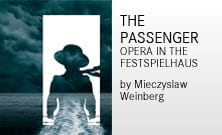 The Bregenzer Festpiele presented the world premiere of The Passenger, the first opera by Mieczysław Weinberg (1919-1996), on July 21.
The Bregenzer Festpiele presented the world premiere of The Passenger, the first opera by Mieczysław Weinberg (1919-1996), on July 21.
Luminario Ballet premiered the ballet Fantasia on Polish Airs, created by “LA’s revered ballet maestro,” Polish choreographer Stefan Wenta, on Aug 6.
On Aug 29, the Polish Baltic Philharmonic gave the world premiere of IVO XXX by Paweł Mykietyn at the “Solidarity of Arts” Festival in Gdańsk. Also, Eva-Maria Zimmermann performed the US Premiere of Mykietyn’s Epiphora (1996) for piano and pre-recorded media at the Other Minds Festival (March4-6) in San Francisco.
A new opera by Marta Ptaszyńska—Kochankowie z klasztoru Valldemosa [Lovers in the Cloister at Valldemosa]—was premiered at the Grand Theater in Łódź on Nov 18.
 The 17th International Festival “Laboratory of Contemporary Music” (Nov 23-28) featured the following premieres: Last of February for string quartet (2010) by Alicja Gronau; Utopia for orchestra (2008) by Paweł Łukaszewski; Sinfonia concertante for trumpet and orchestra (2010) by Aldona Nawrocka; Transient Music for electronic media (2010) by Marcin Wierzbicki; Rachel for mixed choir (2010) by Maria Borecka; Hagafor mixed choir (2010) by Piotr Tabakiernik; and Dies Irae for mixed choir (2008) by Artur Andrzej Cieślak
The 17th International Festival “Laboratory of Contemporary Music” (Nov 23-28) featured the following premieres: Last of February for string quartet (2010) by Alicja Gronau; Utopia for orchestra (2008) by Paweł Łukaszewski; Sinfonia concertante for trumpet and orchestra (2010) by Aldona Nawrocka; Transient Music for electronic media (2010) by Marcin Wierzbicki; Rachel for mixed choir (2010) by Maria Borecka; Hagafor mixed choir (2010) by Piotr Tabakiernik; and Dies Irae for mixed choir (2008) by Artur Andrzej Cieślak
A new rock opera entitled Krzyżacy [Knights of the Cross], written by Hadrian Filip Tabęcki, was premiered on Dec 30
Publications
Former PMC Director Maja Trochimczyk published Chopin with Cherries: A Tribute in Verse (Moonrise Press), which led to several readings in California and Poland.
A new edition of the definitive Chopin biography by Adam Zamoyski, Chopin: Prince of the Romantics (first published 1979, HarperPress), is available again after an absence of many years. Read a review in The Economist
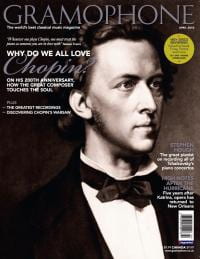 In the April issue of the prestigious Gramophone Magazine, Chopin expert Jeremy Nicholas “attempts to pin down exactly why we all love this man’s music” and provides a guide to the composer, his works and the essential recordings in Frédéric Chopin – a centenary focus.
In the April issue of the prestigious Gramophone Magazine, Chopin expert Jeremy Nicholas “attempts to pin down exactly why we all love this man’s music” and provides a guide to the composer, his works and the essential recordings in Frédéric Chopin – a centenary focus.
The new monograph European ‘Fin de siècle’ and Polish Modernism. The Music of Mieczysław Karłowicz (Ut Orpheus Edizioni) examines the figure of composer Karłowicz (1876-1909) in the broader socio-cultural context which fostered his work.
Musica Iagellonica has published a book by Małgorzata Sułek entitled Pieśni masowe Witolda Lutosławskiego w kontekście doktryny realizmu socjalistycznego [Witold Lutosławski’s Mass Songs in the context of doctrins of social realism]
Polish-American musicologist Halina Goldberg’s book Music in Chopin’s Warsaw was published by Oxford University Press. Read a review here
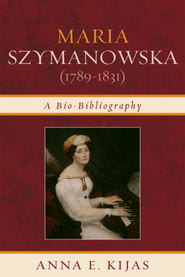 Chopinspire. Współcześni kompozytorzy polscy o Chopinie [Chopinspire. Contemporary
Chopinspire. Współcześni kompozytorzy polscy o Chopinie [Chopinspire. Contemporary
Polish Composers on Chopin], a collection of texts inspired by Chopin and his continued effect on Polish contemporary composers, was published by ZKP, the 2009 Warsaw Autumn Festival, and the Chopin 2010 Celebrations Office.
A new monograph, Maria Szymanowska (1789-1831): A Bio-Bibliography, by Anna E. Kijas was published by The Scarecrow Press.
Edited by Prof. Jan Ekier, the new Polish National Edition of the collected works of Fryderyk Chopin was published by PWM.
Recordings
Too many new Chopin recordings to count were released this year – for a few of our fullest listings, see February, April, and October Newsletters.
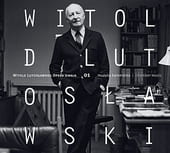 Two volumes of the Opera Omnia series highlighting the greatest works of Witold Lutosławski were released on the CD Accord label (ACD144 and ACD161)
Two volumes of the Opera Omnia series highlighting the greatest works of Witold Lutosławski were released on the CD Accord label (ACD144 and ACD161)
Marston Records released “A Century of Romantic Chopin” (4 CDs), “The Complete Raoul von Koczalski vol. 1: Polydor Recordings 1924 – 1928” (2 CDs) and “The Complete Josef Hofmann: vol. 9” (2 CDs)
Polish pianist Hubert Rutkowski prepared “Pupils of Chopin – Tellefsen, Mikuli, Filtsch, Gutmann” for Naxos Records (8.572344)
British pianist Jonathan Plowright’s recording Hommage à Chopin (Hyperion Records CDA67803), which explores music composed in the style of Chopin by his contemporaries, landed on Gramophone Magazine’s weekly Specialist Classical Top 20 Chart for the week of March 13 and Editor’s Disk of the Month list for April
 Aga Zaryan was the first Polish vocalist to have released an album under the Blue Note insignia, entitled “Looking Walking Being”
Aga Zaryan was the first Polish vocalist to have released an album under the Blue Note insignia, entitled “Looking Walking Being”
Chopin, a new jazz recording by the Filip Wojciechowski Trio—Filip Wojciechowski, piano, Paweł Pańta, bass and Cezary Konrad, drums—was released to much acclaim (PRCD1310)
A listing of new works by Andrzej Panufnik is available in the June Newsletter.
The Cracow Duo and pianist Marek Szlezer (performing on a Pleyel piano from 1845) released “Fryderyk Chopin: The Complete Chamber Works” (DUX 0755)
Agata Zubel – soprano and Marcin Grabosz – piano released a recording entitled “Poems” (CD Accord ACD149-2) featuring Pawel Szymański’s Drei Lieder nach Trakl, which reviewer William Hedley says “create a hugely powerful atmosphere.”
 “Back to Melody” (CD Accord ACD 163), the debut recording of the OPiUM String Quartet, features world premiere recordings of works by Maciej Małecki and Sławomir Czarnecki and a new string arrangement of an old favorite by Wojciech Kilar, Orawa.
“Back to Melody” (CD Accord ACD 163), the debut recording of the OPiUM String Quartet, features world premiere recordings of works by Maciej Małecki and Sławomir Czarnecki and a new string arrangement of an old favorite by Wojciech Kilar, Orawa.
Pianist David Greilsammer’s recording “Tansman-Boulanger-Gershwin” (Naïve Records V5224) features the world premiere recording of Tansman’s Piano Concerto No. 2.
Kielce Philharmonic Records released “We Are From Here,” with music by W. Pawlik, and Vol. 4 of the “Album Polski” series, featuring works by M. Ptaszyńska and G. Bacewicz
We Remember…
Wanda Tomczykowska (29 Aug 1921 – 2 March 2010) – founder of the Polish Arts and Culture Foundation (PACF) in San Francisco
President Lech Kaczyński, First Lady Maria Kaczyńska and the victims of the tragic plane crash on April 10, 2010 in Smolensk, Russia
 Henryk Mikołaj Górecki (6 Dec 1933 – 12 Nov 2010) – leading composer of Polish contemporary classical music
Henryk Mikołaj Górecki (6 Dec 1933 – 12 Nov 2010) – leading composer of Polish contemporary classical music
Irena Anders – singer and actress who toured with Henryk Wars’ band during the WWII
Irena Anders In Memoriam
Irena Anders (1920-2010)
A Tribute by Marek Zebrowski, PMC Director
 With the passing of Irena Anders on 29 November 2010, an important chapter in the history of Poland came to a close. Although she will be mostly remembered as a widow of Poland’s famous World War II general, Władysław Anders, Irena’s career in music and acting represented a lifelong calling that brought her fame and recognition throughout the world.
With the passing of Irena Anders on 29 November 2010, an important chapter in the history of Poland came to a close. Although she will be mostly remembered as a widow of Poland’s famous World War II general, Władysław Anders, Irena’s career in music and acting represented a lifelong calling that brought her fame and recognition throughout the world.
Irena Renata Jarosiewicz was born on 12 May 1920 in Freudethal, near Olomuntz, in the present Czech Republic. Her father, Mikołaj, was a Uniate (Eastern Catholic Rite) priest, whilst her mother, Helena, came from Polish-Ukrainian family of landowners. In 1926 Irena’s parents and four siblings moved to Lwów, where she attended local schools and later began voice studies at the Lwów Music Conservatory right as World War II broke out.
 Irena’s professional career was launched when she was recruited by Henryk Wars to perform with the Tea-Jazz orchestra he created in Lwów in 1940. Henryk Wars (1902-1977) was the most famous Polish composer of film and cabaret music who escaped from a POW transport and managed to reach Lwów after the defeat of Poland in the Nazi blitzkrieg of 1939. Wars’ big band ensemble was composed of about two dozen musicians who also fled from Poland to the Soviet-occupied Lwów. Under the stage name of Renata Bogdańska, Irena began performing and touring the Soviet Union as a soprano soloist with the Wars’ Tea-Jazz orchestra. Her first and brief marriage to Gwidon Borucki (pictured on right with Wars in Baghdad in 1943), another member of Wars’ ensemble, dates from the early war years.
Irena’s professional career was launched when she was recruited by Henryk Wars to perform with the Tea-Jazz orchestra he created in Lwów in 1940. Henryk Wars (1902-1977) was the most famous Polish composer of film and cabaret music who escaped from a POW transport and managed to reach Lwów after the defeat of Poland in the Nazi blitzkrieg of 1939. Wars’ big band ensemble was composed of about two dozen musicians who also fled from Poland to the Soviet-occupied Lwów. Under the stage name of Renata Bogdańska, Irena began performing and touring the Soviet Union as a soprano soloist with the Wars’ Tea-Jazz orchestra. Her first and brief marriage to Gwidon Borucki (pictured on right with Wars in Baghdad in 1943), another member of Wars’ ensemble, dates from the early war years.
 Shortly after Nazi Germany invaded the Soviet Union in June 1941, the so-called Sikorski-Maisky Agreement provided the basis for the formation of a Polish Army composed of Polish citizens interned in the Soviet Union. Simultaneously, General Władysław Anders (1892-1970) was freed from the Lubianka prison in Moscow and appointed the Commander in Chief of the Polish Army in Russia. About 100,000 Poles were released from a number of Soviet prison camps and gulags and assembled in the vicinity of Totskoye and Buzuluk in Southern Siberia, where General Anders organized the incoming refugees into combat units. Many Polish civilians who were at that time on Soviet territory decided to join the Anders’ Army. Together with the members of Wars’ Tea-Jazz orchestra, Irena made a perilous journey across Russia to join the Anders’ Army as well. A few months later, during the spring and summer of 1942, General Anders with his troops and the accompanying civilians were evacuated by ships across the Caspian Sea to the northwest coastal port city of Pahlevi in Persia (now Rasht in Iran). Anders’ soldiers joined the Polish Carpathian Brigade that already fought under British command in North Africa and formed the so-called Polish Second Corps that gallantly fought in Africa and Italy during the last two years of the war.
Shortly after Nazi Germany invaded the Soviet Union in June 1941, the so-called Sikorski-Maisky Agreement provided the basis for the formation of a Polish Army composed of Polish citizens interned in the Soviet Union. Simultaneously, General Władysław Anders (1892-1970) was freed from the Lubianka prison in Moscow and appointed the Commander in Chief of the Polish Army in Russia. About 100,000 Poles were released from a number of Soviet prison camps and gulags and assembled in the vicinity of Totskoye and Buzuluk in Southern Siberia, where General Anders organized the incoming refugees into combat units. Many Polish civilians who were at that time on Soviet territory decided to join the Anders’ Army. Together with the members of Wars’ Tea-Jazz orchestra, Irena made a perilous journey across Russia to join the Anders’ Army as well. A few months later, during the spring and summer of 1942, General Anders with his troops and the accompanying civilians were evacuated by ships across the Caspian Sea to the northwest coastal port city of Pahlevi in Persia (now Rasht in Iran). Anders’ soldiers joined the Polish Carpathian Brigade that already fought under British command in North Africa and formed the so-called Polish Second Corps that gallantly fought in Africa and Italy during the last two years of the war.
Under the name of Polish Parade, Wars’ ensemble accompanied Anders’ Army from Persia to Iraq, Egypt, and Italy, entertaining the troops with concerts and musical theatre shows. By that time Irena became a prominent Polish Parade soloist and a close friend of music director and composer Henryk Wars and his companion, Elżbieta. Through them she was introduced to General Anders whom she married in London a few years later on 12 May 1948.
 Although after the war General Anders retired from the Army, he nonetheless continued to be an important leader of Poles in exile. In the meantime, Irena Anders continued to work as an actress and singer.She played the lead in the 1946 film Wielka Droga [A Momentous Journey] (pictured at right), depicting the history of Polish Second Corps during World War II. In her musical and theatre roles Irena Anders also worked with a number of distinguished writers and musicians who settled in London after the war, including Marian Hemar, Feliks Konarski, Włada Majewska, Zofia Terne, Fryderyk Jaroszy, Gwidon Borucki, and Irena Delmar among others. For several decades Irena Anders toured various Polish émigré centers throughout Western Europe, the Middle East, and the United States, and appeared on BBC World Service, Radio Free Europe, and Voice of America broadcasts. Until recently she regularly performed for the Ognisko Polskie [Polish Hearth Club] and POSK [Polish Social and Cultural Centre] in London, and other Polish émigré organizations worldwide.
Although after the war General Anders retired from the Army, he nonetheless continued to be an important leader of Poles in exile. In the meantime, Irena Anders continued to work as an actress and singer.She played the lead in the 1946 film Wielka Droga [A Momentous Journey] (pictured at right), depicting the history of Polish Second Corps during World War II. In her musical and theatre roles Irena Anders also worked with a number of distinguished writers and musicians who settled in London after the war, including Marian Hemar, Feliks Konarski, Włada Majewska, Zofia Terne, Fryderyk Jaroszy, Gwidon Borucki, and Irena Delmar among others. For several decades Irena Anders toured various Polish émigré centers throughout Western Europe, the Middle East, and the United States, and appeared on BBC World Service, Radio Free Europe, and Voice of America broadcasts. Until recently she regularly performed for the Ognisko Polskie [Polish Hearth Club] and POSK [Polish Social and Cultural Centre] in London, and other Polish émigré organizations worldwide.
After her husband’s death in 1970, Irena continued to represent the General at the annual commemorations of the battle of Monte Cassino in Italy and England. She also began to travel to Poland after 1989, when Poland’s communist government fell and her husband’s role in World War II was officially recognized. She visited countless schools and universities, gave interviews and was received with great warmth by the wide spectrum of Polish society. Always gracious, witty, and ever ready to perform the old favorites—mostly the songs from the Polish Parade days—Irena Anders never failed to delight her fans in Poland with her charming and elegant delivery.
 Irena’s intelligence and great warmth—both as a performer and in private—will be remembered by all who came to know her intimately. The hospitality of her London house and the inevitable wealth of anecdotes were always on full display for those who came across her path. Generously praising others and sometimes disarmingly realistic when referring to her own glamorous life, to the end of her days Irena was a living witness of Poland’s pre-war culture and society. She faithfully kept in touch with old friends like Henryk Wars and his wife who settled in Los Angeles, and Feliks Konarski who moved to Chicago. Whenever at home in London, she happily received and entertained countless old friends who were passing by. Among the numerous accolades and awards she received, the two private audiences with Pope John Paul II in 1979 and 2004 and the Commanders’ Cross of the Polonia Restituta Order received from Poland’s President Lech Kaczyński in May of 2007 were most important. Irena’s 90th birthday party in London in May of 2010 was a great occasion for all her friends and family to assemble and celebrate her long and extraordinary accomplished life.
Irena’s intelligence and great warmth—both as a performer and in private—will be remembered by all who came to know her intimately. The hospitality of her London house and the inevitable wealth of anecdotes were always on full display for those who came across her path. Generously praising others and sometimes disarmingly realistic when referring to her own glamorous life, to the end of her days Irena was a living witness of Poland’s pre-war culture and society. She faithfully kept in touch with old friends like Henryk Wars and his wife who settled in Los Angeles, and Feliks Konarski who moved to Chicago. Whenever at home in London, she happily received and entertained countless old friends who were passing by. Among the numerous accolades and awards she received, the two private audiences with Pope John Paul II in 1979 and 2004 and the Commanders’ Cross of the Polonia Restituta Order received from Poland’s President Lech Kaczyński in May of 2007 were most important. Irena’s 90th birthday party in London in May of 2010 was a great occasion for all her friends and family to assemble and celebrate her long and extraordinary accomplished life.
With Irena Anders’ passing, we say farewell to the enduring symbol of Polish courage and sacrifice during the years of World War II, to a gifted and unique performer in the history of Polish music and, in my case, to a great personal friend. Irena Anders is survived by her daughter, Anna, and a grandson, both residing in the United States.
News
FOCUS! 2011: Polish Modern / Kulenty Premere
 FOCUS! 2011, Juilliard’s 27th annual mid-winter festival of ‘new’ music, presents Polish Modern: New Directions in Polish Music Since 1945. This year’s Festival will feature six free concerts from Saturday, January 22 – Friday, January 28, 2011. The composers presented on the FOCUS! festival represent several generations and a broad range of styles: from Krzysztof Penderecki, Bogusław Schaeffer, Kazimierz Serocki and others born before the mid-1930s; to composers including Krzysztof Knittel, Aleksander Lasoń, Marian Sawa, and Stanisław Moryto from the 1940s; to Paweł Szymanski, Tadeusz Wielecki, and others born ten years later; and Paweł Mykietyn, Aleksandra Gryka, Wojciech Zimowit Zych, and the 1970s generation. The Festival will also include the World Premiere of Hanna Kulenty’s Brass No. 4 (2007) for tuba solo on January 25.
FOCUS! 2011, Juilliard’s 27th annual mid-winter festival of ‘new’ music, presents Polish Modern: New Directions in Polish Music Since 1945. This year’s Festival will feature six free concerts from Saturday, January 22 – Friday, January 28, 2011. The composers presented on the FOCUS! festival represent several generations and a broad range of styles: from Krzysztof Penderecki, Bogusław Schaeffer, Kazimierz Serocki and others born before the mid-1930s; to composers including Krzysztof Knittel, Aleksander Lasoń, Marian Sawa, and Stanisław Moryto from the 1940s; to Paweł Szymanski, Tadeusz Wielecki, and others born ten years later; and Paweł Mykietyn, Aleksandra Gryka, Wojciech Zimowit Zych, and the 1970s generation. The Festival will also include the World Premiere of Hanna Kulenty’s Brass No. 4 (2007) for tuba solo on January 25.
Read an article about the genesis of the “Polish Modern” concept here: www.juilliard.edu. The FOCUS! 2011 festival is presented in collaboration with the Polish Cultural Institute in New York.
The festival opens with the New Juilliard Ensemble, conducted by founder Joel Sachs, performing Grażyna Bacewicz’s Contradizione (1966); Tadeusz Wielecki’s The Time of Stones (2002); Wojciech Kilar’s Choral Prelude (1988); Zygmunt Krauze’s Terra Incognita (1994); and Elżbieta Sikora’s Canzona (1995). The closing concert program, performed by the Juilliard Orchestra and led by conductor Jeffrey Milarsky, is entitled “Portrait of Witold Lutosławski” and highlights the composer considered by many to be one of the greatest of the 20th century. The program includes Lutosławski’s Overture for Strings, Concerto for Cello and Orchestra, Partita for Violin and Orchestra, and the Symphony No. 4, featuring cellist Jeremiah Campbell and violinist Arianna Warsaw-Fan. Both the opening and closing concerts take place in Alice Tully Hall.
 From January 24 – 27, the FOCUS! festival presents four concerts of chamber and solo works by contemporary Polish composers, performed by Juilliard students. Works to be performed include: Krzysztof Penderecki’s Capriccio for Siegfried Palm for cello (1966); Tomasz Sikorski’s Euphonia for piano (1982); Kazimierz Serocki’s Swinging Music for clarinet, double bass, trombone, and piano (1970); Marian Sawa’s Ecce Lignum Crucis for organ (1986); selections from Wojciech Ziemowit Zych’s Homage a Gyorgy Kurtag for violin and bass clarinet (2005-06); Marta Ptaszyńska’s Six Bagatelles for harp (1979); Wojciech Blazejczyk’s Interlunium for guitar (2007); Marek Stachowski’s Musica Festeggiante for string quartet (1995) Paweł Mykietyn’s Sonata for Cello (2006); Hanna Kulenty’s Brass No. 4 (2007) for tuba solo; Aleksander Lasoń’s String Quartet No. 7 (2007); Paweł Szymanski’s Through the Looking Glass III for harpsichord (1994); Marcel Chyrzynski’s ForMS for cello (2001); Witold Szalonek’s Toccata and Chorale for organ (1988), in the 1990 version for piano; Krzysztof Knittel’s The Conqueror Worm (1976); Mateusz Bien’s Turdidae (1992); Marek Choloniewski’s Physical Modeling (2004); Andrzej Krzanowski’s Relief V for cello (1986); Aleksandra Gryka’s Oxygen No. 369.1 for piano and electronic sounds (2000); Aleksander Nowak’s June-December (2005); Jakub Ciupinski’s Edo for violin and electronic sounds (2010); Henryk Mikołaj Górecki’s String Quartet No. 1, “Already It Is Dusk” (1986); Bogusław Schaeffer’s Sonata IV, “February” from The Four Seasons for organ (1986); Eugeniusz Knapik’s Filo d’Arianna for cello (2005); Joanna Bruzdowicz’s Erotiques for piano (1966); Tadeusz Baird’s Play for string quartet (1971); Stanisław Moryto’s Five Songs on Texts by Elias Rajzman for mezzo-soprano and piano (2002); Agata Zubel’s Ludia i Fu (1999); Jerzy Kornowicz’s The Shapes of the Elements for harpsichord and tape (2006/2011); and Augustyn Bloch’s Geige und Orgel for violin and organ (1988). Chamber music concerts take place in Juilliard’s Paul Hall (155 West 65th Street).
From January 24 – 27, the FOCUS! festival presents four concerts of chamber and solo works by contemporary Polish composers, performed by Juilliard students. Works to be performed include: Krzysztof Penderecki’s Capriccio for Siegfried Palm for cello (1966); Tomasz Sikorski’s Euphonia for piano (1982); Kazimierz Serocki’s Swinging Music for clarinet, double bass, trombone, and piano (1970); Marian Sawa’s Ecce Lignum Crucis for organ (1986); selections from Wojciech Ziemowit Zych’s Homage a Gyorgy Kurtag for violin and bass clarinet (2005-06); Marta Ptaszyńska’s Six Bagatelles for harp (1979); Wojciech Blazejczyk’s Interlunium for guitar (2007); Marek Stachowski’s Musica Festeggiante for string quartet (1995) Paweł Mykietyn’s Sonata for Cello (2006); Hanna Kulenty’s Brass No. 4 (2007) for tuba solo; Aleksander Lasoń’s String Quartet No. 7 (2007); Paweł Szymanski’s Through the Looking Glass III for harpsichord (1994); Marcel Chyrzynski’s ForMS for cello (2001); Witold Szalonek’s Toccata and Chorale for organ (1988), in the 1990 version for piano; Krzysztof Knittel’s The Conqueror Worm (1976); Mateusz Bien’s Turdidae (1992); Marek Choloniewski’s Physical Modeling (2004); Andrzej Krzanowski’s Relief V for cello (1986); Aleksandra Gryka’s Oxygen No. 369.1 for piano and electronic sounds (2000); Aleksander Nowak’s June-December (2005); Jakub Ciupinski’s Edo for violin and electronic sounds (2010); Henryk Mikołaj Górecki’s String Quartet No. 1, “Already It Is Dusk” (1986); Bogusław Schaeffer’s Sonata IV, “February” from The Four Seasons for organ (1986); Eugeniusz Knapik’s Filo d’Arianna for cello (2005); Joanna Bruzdowicz’s Erotiques for piano (1966); Tadeusz Baird’s Play for string quartet (1971); Stanisław Moryto’s Five Songs on Texts by Elias Rajzman for mezzo-soprano and piano (2002); Agata Zubel’s Ludia i Fu (1999); Jerzy Kornowicz’s The Shapes of the Elements for harpsichord and tape (2006/2011); and Augustyn Bloch’s Geige und Orgel for violin and organ (1988). Chamber music concerts take place in Juilliard’s Paul Hall (155 West 65th Street).
Other highlights of the festival include a film screening and a panel discussion about contemporary music in Poland with editor-in-chief of the Polish Music Publishing House and program director of the Polish Music Festival, Andrzej Kosowski; president of the Polish Composers’ Union, Jerzy Kornowicz; composer Elżbieta Sikora; and director of the Warsaw Autumn Festival, Tadeusz Wielecki, moderated by Joel Sachs.
January 22-28, 2011
FOCUS! 2011 Festival – Polish Modern: New Directions in Polish Music Since 1945
Juilliard School of Music
Alice Tully Hall & Paul Hall, New York, NY
Tickets: FREE, but required – visit the Janet and Leonard Kramer Box Office
Information: (212) 769-7406 or www.juilliard.edu/focus
[Source: Press release]
Penderecki Premiere Concludes Chopin Year
 On January 14, the world première of a new composition by Krzysztof Penderecki will take place in the Concert Hall of the Warsaw Philharmonic in Poland. Commissioned and organized by the Polish National Fryderyk Chopin Institute, the gala premiere will conclude the year-long celebrations of the 200th anniversary of Fryderyk Chopin’s birth.
On January 14, the world première of a new composition by Krzysztof Penderecki will take place in the Concert Hall of the Warsaw Philharmonic in Poland. Commissioned and organized by the Polish National Fryderyk Chopin Institute, the gala premiere will conclude the year-long celebrations of the 200th anniversary of Fryderyk Chopin’s birth.
The work is entitled Powiało na mnie morze snów… Pieśni zadumy i nostalgii [A Sea of Dreams has Fallen on Me… Songs of Reverie and Nostalgia] and is written for soprano, mezzo-soprano, baritone, choir and orchestra. It will be performed by Wioletta Chodowicz (soprano) Agnieszka Rehlis (mezzo-soprano), Mariusz Godlewski (baritone) and the Choir of the Warsaw Philharmonic, conducted by Henryk Wojnarowski. The singers are accompanied by the Sinfonia Varsovia. The evening is hosted by world famous Russian conductor, Valery Gergiev.
[Source: chopin2010.pl]
Krzysztof Meyer Commission
Eminent Polish composer, Krzysztof Meyer, has completed a major work for violin and piano entitled Imaginary Variations. The piece was commissioned by American violinist Janet Packer, an ardent champion of new music for the violin. Funded under the auspices of the Pro Violino Foundation, Inc., the work will receive many performances throughout the United States and abroad during Ms. Packer’s 2011-2012 concert touring season.
Born in Kraków in 1943, Krzysztof Meyer has been a distinguished figure in European musical life for nearly a half century. A student of Krzysztof Penderecki, Witold Lutosławski and Nadia Boulanger, Meyer is one of the most prominent Polish composers of his generation. His oeuvre includes 4 operas, 5 symphonies, 12 string quartets, 2 violin concerti, 5 piano sonatas, and many other orchestral, chamber, and solo instrumental works. From 1985 to 1989 he served as President of the Polish Composers’ Union [ZKP].
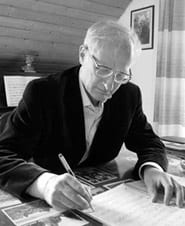 Krzysztof Meyer (left) is the winner of numerous awards, including the First Prize at the Competition for Young Composers in France (1966), Second Prize at the Young Polish Composers’ Competition for Symphony No.1 (1966), the Aaron Copland Scholarship (1966), Grand Prix at the Prince Pierre de Monaco International Composer’s Competition for his opera Cyberiada (1970), twice Special Mention at Tribune Internationale des Compositeurs UNESCO for String Quartet No. 2 and String Quartet No. 3 (Paris, 1970 and 1976 respectively), First Prize at the Karol Szymanowski Competition for Symphony No. 4 (Warsaw,1974), the Gotfried-von-Herder-Preis (Vienna,1984), the annual Award of the Union of Polish Composers (Warsaw, 1992), the Alfred Jurzykowski Award (New York, 1993) and the Johann-Stamitz-Preis (Mannheim, 1996), among others. Adding to his already impressive discography, a recording of his music for cello and piano was recently released on the Toccata Classics label (TOCC0098).
Krzysztof Meyer (left) is the winner of numerous awards, including the First Prize at the Competition for Young Composers in France (1966), Second Prize at the Young Polish Composers’ Competition for Symphony No.1 (1966), the Aaron Copland Scholarship (1966), Grand Prix at the Prince Pierre de Monaco International Composer’s Competition for his opera Cyberiada (1970), twice Special Mention at Tribune Internationale des Compositeurs UNESCO for String Quartet No. 2 and String Quartet No. 3 (Paris, 1970 and 1976 respectively), First Prize at the Karol Szymanowski Competition for Symphony No. 4 (Warsaw,1974), the Gotfried-von-Herder-Preis (Vienna,1984), the annual Award of the Union of Polish Composers (Warsaw, 1992), the Alfred Jurzykowski Award (New York, 1993) and the Johann-Stamitz-Preis (Mannheim, 1996), among others. Adding to his already impressive discography, a recording of his music for cello and piano was recently released on the Toccata Classics label (TOCC0098).
In addition to being a virtuoso pianist and composer, Meyer is also a sought-after music historian and pedagogue. He has taught several generations of students in music history, theory and composition in both his native Poland and, from 1987 to 2008, at the Hochschule für Musik in Cologne. He is a frequent lecturer on the subject of contemporary music in many countries, including Russia, Germany, Austria, Brazil and Japan. He is also author of many books and articles. His monograph on the life and work of Dmitri Shostakovich (Paris, 1994), the first in Polish, has become an international bestseller and has been translated into six languages. With his wife, Danuta Gwizdalanka, he also published a two-volume biography of Witold Lutosławski.
[Source: janetpacker.com]
Polish Musicians’ Forum Meeting
The first meeting of Polish Orchestra Musicians’ Forum was held on 28 November 2010 in Warsaw, with about 60 musicians representing over 20 orchestras and choral groups from all over Poland. It was organized by the musicians’ unions representing the Grand Theatre-Polish National Opera in Warsaw, the National Polish Radio Symphony Orchestra in Katowice, and Sinfonia Varsovia. The main subject of the meeting was the proposed new law regarding the organization and management of cultural institutions. The musicians present maintained that the proposed law does not take into account the specific working conditions of musicians and does not reflect their needs, nor does it contain proposals advanced by the musicians or their representatives. Since the new law would extend preferential treatment to groups representing employers, the musicians gathered at the forum decided to appeal in writing to Poland’s Prime Minister, Donald Tusk, protesting the situation.
 Dated 1 December 2010, the open letter to Prime Minister Donald Tusk (right) decries the lack of consultation with those who would be directly affected by the legislation and highlights several very controversial issues that would be enshrined by the new law. Among them are the provisions that require a 15-year waiting period before a tenured position could be obtained, or the obligation to obtain consent in advance for all free-lance work from the main employer. The letter further appeals to the Prime Minister to halt work on the proposed bill and instead draft new legislation that would follow European Union rules, which are much more favorable to working musicians.
Dated 1 December 2010, the open letter to Prime Minister Donald Tusk (right) decries the lack of consultation with those who would be directly affected by the legislation and highlights several very controversial issues that would be enshrined by the new law. Among them are the provisions that require a 15-year waiting period before a tenured position could be obtained, or the obligation to obtain consent in advance for all free-lance work from the main employer. The letter further appeals to the Prime Minister to halt work on the proposed bill and instead draft new legislation that would follow European Union rules, which are much more favorable to working musicians.
The letter was signed by the presiding officers of the First Forum of Polish Orchestra Musicians, including: Katarzyna Demus, Artur Gadzała, Jan Kacperczyk, Andrzej Konieczny, Bogusław Pstraś, Justyna Rogozińska-Czeżyk, and Damian Walentek.
[Source: polmic.pl, Photo: premier.gov.pl]
Polish Forgotten Music Recording Competition
 Acte Préalable Music Publishing [Wydawnictwo Muzyczne Acte Préalable] and Jan A. Jarnicki would like to announce their Eighth Recording Project Competition called “Polish Forgotten Music.”
Acte Préalable Music Publishing [Wydawnictwo Muzyczne Acte Préalable] and Jan A. Jarnicki would like to announce their Eighth Recording Project Competition called “Polish Forgotten Music.”
The competition is addressed to all performers, soloists and ensembles, regardless of their nationality, education, age, and place of residence, who have not released before, or are not in the process of releasing, a recording with music. In order to take part in the competition, you need to submit the following information to the Publisher (e-mails are acceptable) by
February 28, 2011:
1) curriculum vitae with photos of all the competitors (artists, ensemble; if the ensemble is larger than a sextet the information should concern only the ensemble);
2) signed declaration stating that the artists have not released a musical record before (each artist if the ensemble is not larger than a sextet);
3) project repertoire must be written by Polish composers or by those composers who had close links with Poland and who died no later than 1941. The repertoire must fulfill the programmatic requirements of the competition;
4) sample recording of any repertoire (on CD-R or by e-mail);
5) copy of all the score materials necessary for the recording process.
Acte Préalable will decide on the winner of the competition until 31 March 2011 and will announce the results in the May issue of the Muzyka21 magazine. The Publisher will record the project of the winner and then release it in CD format. The Publisher reserves the right to modify the project. Projects containing music by only one composer are favored. When submitting the project, the competitors must be in possession of all the score materials necessary for the recording process, the rights to perform and record it, as well as permission from all the artists who are going to take part in the recording. The winner of the competition will have four months to prepare the repertoire. Afterwards, the Publisher will set the date of the rehearsal, and then there will be a decision concerning the date of the recording sessions.
The competition organizer’s address:
Acte Préalable Music Publishing
PO Box 71 – 02-800 Warsaw 93
tel./fax 0 – 22 648 88 38 · actepre_konkurs@interia.eu
www.acteprealable.com
Sylvestre/Kaplanek Duo In Calgary
On January 7, 2011, Christ Church in Calgary will present the Sylvestre/Kaplanek Duo. The program will include works by Szymanowski, as well as the Sonate Posthume by Ravel and the Klavierstücke, op. 118 by Brahms.
Violinist Jerzy Kaplanek is a member of the world-renowned Penderecki String Quartet and has performed throughout North and South America as well as Europe and Asia. He has partnered with Janina Fialkowska, Francine Kay, Jamie Parker, James Campbell and others. Mr. Kaplanek has recorded over two dozen CD’s and is an Associate Professor at Wilfred Laurier University.
Pianist Stéphan Sylvestre enjoys an active performing career as a recitalist, orchestra soloist and chamber musician and has collaborated with many artists including James Campbell, James Sommerville, Ransom Wilson, Martin Beaver, Corey Cerovsek, the Penderecki String Quartet and others. He is currently an Assistant Professor of Piano at the Don Wright Faculty of Music at the University of Western Ontario.
January 7, 2011 | 8:00 p.m.
Sylvestre/Kaplanek Duo play Ravel, Brahms and Szymanowski
Christ Church
3602 8 St S.W., Calgary, AB Canada
Tickets: $25/20, at the door or by calling 403.243.4680 x31
[Photo: poloniawcalgary.com]
Grella-Mozejko In Edmonton
 Also on January 7, in Edmonton, AB, the third concert of the Tonus Vivus Society’s 2010-2011 New Music Alberta Concert Series will combine works of Pierre Boulez with several pieces by local composers. Entitled “Boulez is Alive,” the program will include Boulez’s Dérive II; One Group Of A Number Of Beings (world premiere) and selections from Of Such A Group by Edmonton composer Ian Crutchley; In una rete di linee che s’intrecciono by Vancouver composer Jordan Nobles; and Tombeau sur la mort de Monsieur Górecki for Amplified Alto Flute Solo and Small Orchestra by Polish-Canadian composer Piotr Grella-Mozejko (left), who also lives in Edmonton. The concert will be performed by the Victoria, B.C.-based Aventa Ensemble.
Also on January 7, in Edmonton, AB, the third concert of the Tonus Vivus Society’s 2010-2011 New Music Alberta Concert Series will combine works of Pierre Boulez with several pieces by local composers. Entitled “Boulez is Alive,” the program will include Boulez’s Dérive II; One Group Of A Number Of Beings (world premiere) and selections from Of Such A Group by Edmonton composer Ian Crutchley; In una rete di linee che s’intrecciono by Vancouver composer Jordan Nobles; and Tombeau sur la mort de Monsieur Górecki for Amplified Alto Flute Solo and Small Orchestra by Polish-Canadian composer Piotr Grella-Mozejko (left), who also lives in Edmonton. The concert will be performed by the Victoria, B.C.-based Aventa Ensemble.
SEE Magazine gives this report about the new work by Grella-Mozejko:
Mark Takeshi McGregor, the flautist in the ensemble, will be performing the only concerted work on the programme, “Tombeau sur la mort de Monsieur Górecki for Amplified Alto Flute Solo and Small Orchestra” by Edmonton composer Piotr Grella-Mozejko. Of the work, McGregor describes it as “really beautiful. It’s tough [to play], it’s deceptively difficult.”
The solo part is truly free, having no time signature or measures, while the orchestral accompaniment is totally structured.
“For me, the scary part’s going to be coordinating my part with the ensemble, because there’s so much freedom. . . . It’s a really beautiful melody and the same melody keeps coming back and it keeps getting transposed higher and gradually becomes faster and faster, so it’s actually interesting to sort of revisit the same melody through different lenses.”
The work begins in a haunting, meditative manner in the lowest register of the alto flute and gradually becomes more impassioned and visceral. “There are all sorts of added layers of emotional intensity,” McGregor adds.
[Jerry Ozpiko, “The Boulez Correspondence,” 6 January 2011]
January 7, 2011 | 8:00 P.M.
III. Boulez is Alive – Aventa Ensemble
Muttart Hall, Alberta College
[Source: seemagazine.com, tonusvivus.com]
Kaczmarek on KUSC
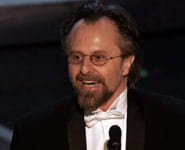 On Monday, January 10 at 9:00 pm, host Jim Svejda will interview Oscar-winning Polish composer Jan A.P. Kaczmarek on Classical KUSC, FM 91.5 during his coveted “Evening Program.” The interview will highlight his most recent score to Get Low as well as other films, such as Finding Neverland (Best Original Score, 2004).
On Monday, January 10 at 9:00 pm, host Jim Svejda will interview Oscar-winning Polish composer Jan A.P. Kaczmarek on Classical KUSC, FM 91.5 during his coveted “Evening Program.” The interview will highlight his most recent score to Get Low as well as other films, such as Finding Neverland (Best Original Score, 2004).
Listen live here: www.classicalkusc.org/stream/listen.html.
[Source: kusc.org]
Penderecki in L.A.
The Da Camera Society of Mt. St. Mary’s College presents the most recent in its “Chamber Music in Historical Places” series: a solo recital with cellist Peter Stumpf, performing Penderecki and Britten in the Keeler House.
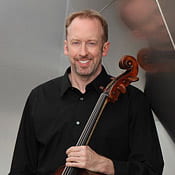 Built on an “impossible” cliffside lot by one of Southern California’s most distinguished architects, the Keeler House creates a cascade of space that tumbles through the house amidst redwood and teak highlights, built-in furniture designed by the architect and ocean views. L.A. Philharmonic principal cellist Peter Stumpf returns to the series to continue his tour of the unaccompanied solo cello repertoire in works of Britten (Suite No. 2) and Penderecki (Per Slava) which provide a perfect foil to the beauty and drama of the Keeler House.
Built on an “impossible” cliffside lot by one of Southern California’s most distinguished architects, the Keeler House creates a cascade of space that tumbles through the house amidst redwood and teak highlights, built-in furniture designed by the architect and ocean views. L.A. Philharmonic principal cellist Peter Stumpf returns to the series to continue his tour of the unaccompanied solo cello repertoire in works of Britten (Suite No. 2) and Penderecki (Per Slava) which provide a perfect foil to the beauty and drama of the Keeler House.
Sunday, January 16, 2011 | 2:00 & 4:00 p.m.
Chamber Music in Historical Places: Peter Stumpf
Keeler House – Pacific Palisades, CA
Tickets: 213.477.2929 or dacamera.org
[Source: Clickable Chamber Music Newsletter, dacamera.org, .laphil.com]
January At Kosciuszko Fdn
 On January 12, a jazz concert with the Bobby Avey/Samuel Blaser Duo will kick off their ensemble’s upcoming European tour with a concert at the Kosciuszko Foundation. Pianist Bobby Avey and trombonist Samuel Blaser come together to form an exciting duo of imaginative musicians, playing original compositions bathed in the 20th century milieu of Bartok and Messiaen, where improvisation plays a heavy role in the fabric of the music. All About Jazz NY writes, “Samuel Blaser is well on his way to claiming a prominent place in the forefront of jazz,” while Dan McClenaghan of All About Jazz deems Avey “an indisputable rising star.” The ensemble will play 4 dates in Poland, starting with the Od Nowa Jazz Festival in Toruń on February 26.
On January 12, a jazz concert with the Bobby Avey/Samuel Blaser Duo will kick off their ensemble’s upcoming European tour with a concert at the Kosciuszko Foundation. Pianist Bobby Avey and trombonist Samuel Blaser come together to form an exciting duo of imaginative musicians, playing original compositions bathed in the 20th century milieu of Bartok and Messiaen, where improvisation plays a heavy role in the fabric of the music. All About Jazz NY writes, “Samuel Blaser is well on his way to claiming a prominent place in the forefront of jazz,” while Dan McClenaghan of All About Jazz deems Avey “an indisputable rising star.” The ensemble will play 4 dates in Poland, starting with the Od Nowa Jazz Festival in Toruń on February 26.
Wed., January 12, 2011 | 7:30 pm
Bobby Avey/Samuel Blaser Duo In Concert
Kosciuszko Foundation
15 East 65th Street New York, NY 10065
Telephone: (212) 734-2130
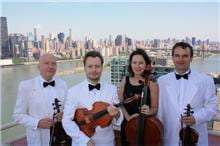 The Slavic Arts Ensemble will present a special New Year program on Sunday, January 16 at 3:00 pm. The group is comprised of Krzysztof Kuznik – I violin, Mieczysław Gubernat – II violin, Maurycy Banaszek – viola, and Marta Będkowska – violoncello. The program will include the music of Fryderyk Chopin, I. J. Paderewski, Marcin Mielczewski, Pietro A. Yon, Walter Legawiec, and G. F. Haendel.
The Slavic Arts Ensemble will present a special New Year program on Sunday, January 16 at 3:00 pm. The group is comprised of Krzysztof Kuznik – I violin, Mieczysław Gubernat – II violin, Maurycy Banaszek – viola, and Marta Będkowska – violoncello. The program will include the music of Fryderyk Chopin, I. J. Paderewski, Marcin Mielczewski, Pietro A. Yon, Walter Legawiec, and G. F. Haendel.
Sun., January 16, 2011 | 3:00 pm
Slavic Arts Ensemble – New Year program
Kosciuszko Foundation
15 East 65th Street New York, NY 10065
Telephone: (212) 734-2130
No conductor, no bow ties, just strings… On Sunday, January 23, the String Orchestra of New York City (SONYC) presents the following all-Polish program: Sonata by S. Szarzyński, Quartet Op. 9 for string orchestra by S. Noskowski, Concerto for String Orchestra by G. Bacewicz, and Sinfonietta for strings by K. Penderecki.
 Now in its eleventh season, SONYC has established itself as one of the leading young ensembles in New York City. A conductorless chamber ensemble, SONYC members rehearse in a collaborative effort that allows each musician to have an impact on the artistic process. The flexibility and intimacy of a string quartet are thus fused with the power and scope of an orchestra. SONYC members are—violinists: Monica Bauchwitz,Caroline Chin, Jennifer Choi, Anna Elashvili, Susan Heerema, Katharina Grossmann, Omar Guey, Asmira Woodward-Page and Yonah Zur; violists: Stephanie Griffin, William Hakim, Jessica Meyer and Ariel Rudiakov; cellist David Calhoun and bassist Peter Weitzner.
Now in its eleventh season, SONYC has established itself as one of the leading young ensembles in New York City. A conductorless chamber ensemble, SONYC members rehearse in a collaborative effort that allows each musician to have an impact on the artistic process. The flexibility and intimacy of a string quartet are thus fused with the power and scope of an orchestra. SONYC members are—violinists: Monica Bauchwitz,Caroline Chin, Jennifer Choi, Anna Elashvili, Susan Heerema, Katharina Grossmann, Omar Guey, Asmira Woodward-Page and Yonah Zur; violists: Stephanie Griffin, William Hakim, Jessica Meyer and Ariel Rudiakov; cellist David Calhoun and bassist Peter Weitzner.
Sun., January 23, 2011 | 4:00 pm
String Orchestra of New York City
Kosciuszko Foundation
15 East 65th Street New York, NY 10065
Telephone: (212) 734-2130
Chopin’s Story Trailer
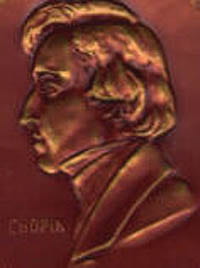 The trailer for a new documentary, Chopin’s Story narrated by Ian Gillan, is now available on youtube.com. The movie is about the rise of the extraordinary artistic genius of young Frederic Chopin and documents his Polish years.
The trailer for a new documentary, Chopin’s Story narrated by Ian Gillan, is now available on youtube.com. The movie is about the rise of the extraordinary artistic genius of young Frederic Chopin and documents his Polish years.
Ian Gillan, the vocalist of rock band Deep Purple, takes you on the journey around Poland to show how his home country and the local people helped creating one of the most prominent artist in the history of classical music. The movie is a contemporary take on how a piece of local culture morphed into beloved treasure of European culture.
World’s Largest Piano?
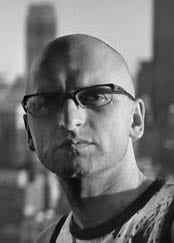 Poland has unveiled a giant piano weighing nearly two tons and with a height of six meters, which could be the world’s largest ever piano. The musical instrument will attempt to beat the Guinness Record as the world’s biggest concert piano. Daniel Czapiewski, manufacturer of wooden houses and author of the project, is an enthusiast of Polish history and promoter of the Kaszuby region. Polish jazz pianist Leszek Możdżer (pictured at left) was the first to play the instrument for the Guinness Record officials and a select audience in December.
Poland has unveiled a giant piano weighing nearly two tons and with a height of six meters, which could be the world’s largest ever piano. The musical instrument will attempt to beat the Guinness Record as the world’s biggest concert piano. Daniel Czapiewski, manufacturer of wooden houses and author of the project, is an enthusiast of Polish history and promoter of the Kaszuby region. Polish jazz pianist Leszek Możdżer (pictured at left) was the first to play the instrument for the Guinness Record officials and a select audience in December.
[Source: presstv.com]
Awards
4th Int’l Composers’ Competition In Poznań
 In December 2010, the first stage of the Fourth International Composers’ Competition of the I. J. Paderewski Academy of Music in Poznań took place. This year, the Competition celebrated the 90th anniversary of the Academy. Due to a very high rate of participation as well as unexpected winter weather that stalled the travel of several jury members, the announcement of the three finalist compositions was delayed.
In December 2010, the first stage of the Fourth International Composers’ Competition of the I. J. Paderewski Academy of Music in Poznań took place. This year, the Competition celebrated the 90th anniversary of the Academy. Due to a very high rate of participation as well as unexpected winter weather that stalled the travel of several jury members, the announcement of the three finalist compositions was delayed.
On December 14, the jury—comprised of Lidia Zielińska (Poland – Jury President), Jacek Domagała (Germany), Aleksander Lasoń (Poland), Jerzy Kornowicz (Poland), Charlotte Seither (Germany), and Monika Kędziora (Poland – Jury Secretary)—announce the following finalists:
- Hesitate;Chase – submitted anonymously by “8844”
- Metamorfosi dei riflessi – submitted anonymously by “Reflections”
- Ever-changing Veins of Stone – submitted anonymously by “Cosmos Palladium is strong”
The identities of the composers will be made public when the compositions are performed at a special concert on April13, 2011 at the Aula Nova in Poznań. At that time, the jury will also designate the I, II and III Prizes. The concert will be accompanied by the International Music Conference “Musica practica – musica theoretica,” held from April 13-14.
[Sources: amuz.edu.pl, polmic.pl]
Starr In California Hall Of Fame
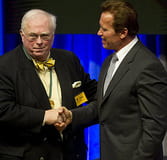
On December 14, Dr. Kevin Starr—USC College historian and participant in the “What Makes a Man Immortal?” panel during the recent Paderewski at 150 Celebrations—was among the legendary Californians inducted into the 2010 California Hall of Fame. Dr. Starr and 14 others were awarded the Spirit of California medal by former Governor Arnold Schwarzenegger and first lady Maria Shriver, who founded the California Hall of Fame in 2006, during a ceremony at the California Museum for History, Women and the Arts in Sacramento. The private awards ceremony was preceded by public red carpet arrivals and opening of the 2010 California Hall of Fame exhibit.
“I can think of only one honor greater—being on the USC faculty,” said University Professor Starr, who served as California State Librarian from 1994 to 2004. Considered to be the nation’s leading expert on California history, Starr was credited for his lifetime of work chronicling the state as a scholar, journalist and historian. [USC News]
Other honorees included: screen and music icon Barbra Streisand; actress Betty White; filmmaker James Cameron; businessman and philanthropist Levi Strauss; tennis champion Serena Williams; Facebook founder Mark Zuckerberg; and former Governor Edmund G. “Pat” Brown, which was accepted by his son, Governor-elect Jerry Brown.
[Sources: uscnews.usc.edu, sacbee.com, Photo: Hector Amezcua/The Sacramento Bee]
Festivals
“Sources & Inspirations” Percussion Festival
 Between 17th and 20th February 2011, the Academy of Music in Kraków will organize the 7th International Percussion Festival “Sources and Inspirations.” The theme of this year’s edition is Percussion Ensembles. The goal is to demonstrate how diverse music for percussion ensembles can be—in terms of style, genre and the selection of instruments. The instruments and ensembles presented will come from all over the world.
Between 17th and 20th February 2011, the Academy of Music in Kraków will organize the 7th International Percussion Festival “Sources and Inspirations.” The theme of this year’s edition is Percussion Ensembles. The goal is to demonstrate how diverse music for percussion ensembles can be—in terms of style, genre and the selection of instruments. The instruments and ensembles presented will come from all over the world.
The following ensembles have thus far confirmed their appearance at the festival:
The Freiburg Percussion Group (Germany) will perform together with the Amadrums Group from Kraków, in a new repertoire of contemporary percussion chamber music which is highly demanding both technically and musically. Among their presented works, audiences will hear Pleiades by I.Xenakis
The Succession Percussion Group from Taiwan is a group of young percussion players (mostly female musicians) who will present an original percussion stage performance for their first performance in Poland.
Ritmodelia and the West Africa Project are two percussion groups specializing in diversified ethnic percussion music. Their concert will be a combination of sources and inspirations, during which musicians from Poland and from Africa will perform on original African instruments.
AKKU (Norway) – this mysterious name belongs to a highly original ensemble that performs excellent music inspired by the folklore of the north. It consists of a tuba player and of two charismatic singers who use the Inuit vocal techniques, such as overtone singing and hyperventilation. This kind of music is rarely head in our concert halls. It is trance-like and full of rhythm.
Soloists Martin Lorentz (Switzerland – pictured above) and Billy Hart (USA) will also participate in the festival, bringing with them contemporary experimental European music and American jazz at its best.
[Source: amuz.krakow.pl]
Discography
New on NAXOS
 TANSMAN: 24 Intermezzi / Petite Suite
TANSMAN: 24 Intermezzi / Petite Suite
Aleksander Tansman (1897-1986): 24 Intermezzi (Books 1-4) and Petite Suite
Eliane Reyes, piano
Naxos 8.572266
Polish by birth, Alexandre Tansman settled in France in 1919 where he soon joined the ranks of the most prominent French and other European composers and musicians of the time. After many years of undeserved neglect, his vast catalogue of music is being rediscovered and enjoyed today. Ranging from tranquil lyricism to tragic gravity, Tansman’s highly sophisticated 24 Intermezzi are a form of intimate musical diary, written at a time when the composer’s life was divided between Europe and the USA. His inventive Petite Suite and Ravel-like Valse-Impromptu are no less delightful. A laureate of numerous competitions, Eliane Reyes is recognised as a rising star of her generation both as a soloist and chamber musician, with concerts throughout the world.
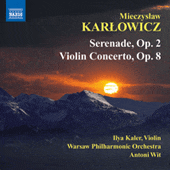 KARLOWICZ: Serenade / Violin Concerto
KARLOWICZ: Serenade / Violin Concerto
Mieczysław Karłowicz: Serenade, Op. 2 and Violin Concerto in A major, Op. 8
Ilya Kaler, violin; Warsaw Philharmonic Orchestra; Antoni Wit, Conductor
Naxos 8.572274
Described by Gramophone as a ‘magician, bewitching our ears’, Russian-born American-based violinist Ilya Kaler has won 1st Prizes and Gold Medals at the Tchaikovsky, Sibelius and the Paganini Competitions and made many acclaimed Naxos recordings. He is an ideal soloist in Mieczysław Karłowicz’s attractive and spirited Violin Concerto. The Serenade, Karłowicz’s first orchestral work, signals the young composer’s extraordinary command of expressive ideas and opulent harmonies. Karłowicz’s Symphonic Poems Volumes 1 (8.570452) and 2 (8.570295) conducted by Antoni Wit are also available.
[Source: classicsonline.com, naxos.com]
Chopin On New Steinway Label
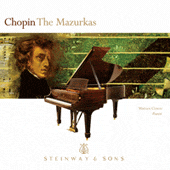 CHOPIN: The Mazurkas
CHOPIN: The Mazurkas
F. Chopin: complete mazurkas
Mirian Conti, piano
Steinway and Sons Steinway30003 (2 Disc)
From a ClassicsToday.com review by Jed Distler:
Best known for her advocacy of Latin-American composers, Mirian Conti’s first project for the newly launched Steinway & Sons label is given over to Chopin’s complete Mazurkas. Fusing instinct and intellect, Conti clearly has thought these amazingly inventive and diverse pieces through insofar as tempos, tone color, voicings, and ornamentation are concerned. I’ll cite one cogent example: Conti begins the C-sharp minor Op. 33 No. 1’s unaccompanied modal melody in an unusually soft and offhanded manner. Once the left hand enters, the pianist increases intensity not so much in volume as by way of subtle legato phrasing, where notes seem to overlap by a split second, as if attempting to make the piano notes slide into each other in the manner of a singer. There’s plenty of zest and abandon in the giddy D-flat major second theme, yet it is tempered by Conti’s discrete pedaling and careful observance of Chopin’s often ignored rests. However, she catches you off guard with a few strategically placed bass-note sforzandos. Thousands of similarly fetching details abound throughout this release.
Notice Conti’s hushed approach to Op. 7 No. 1’s strange third theme, and how she peppers her conversational shaping of Op. 24 No. 2’s main theme with a slight yet stinging accent. Op. 59 No. 3’s lusty momentum and pronounced dynamic contrasts recall Martha Argerich’s similarly epic reading, while Op. 63 No. 3’s canonic voices manage to sound distinct from each other without any underlining on the pianist’s part. Conti’s aforementioned legato technique particularly stands out in two A minor Mazurkas–the Op. 17 No. 4 and the “Notre Temps” without opus number.
[Source: classicsonline.com]
New Bacewicz
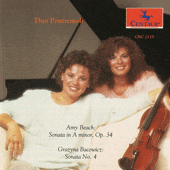 Duo Pontremoli: Bacewicz, Beach
Duo Pontremoli: Bacewicz, Beach
Grażyna Bacewicz: Violin Sonata No. 4, Amy Beach: Violin Sonata in A minor, Op. 34
Duo Pontremoli (Anita Pontremoli, Terri Pontremoli)
Centaur Records CRC2119
[Source: classicsonline.com]
Performances
Totenberg Celebrates Birthday Milestone
A very special birthday celebration for the famous violinist Roman Totenberg took place at Boston College’s Symphony Hall on Saturday, November 21, 2010. A Centennial Celebration of Roman Totenberg marked this milestone birthday and a century of a life of music. The concert was also the first ever to be streamed lived from the Symphony Hall—the video is available at www.bu.edu/cfa/totenberg100.
 Roman Totenberg was born in Łódź, Poland on January 1, 1911, and was recognized as a child prodigy by the time he was six. By the age of eleven, he had both made his professional debut with the Warsaw Philharmonic under conductor Grzegorz Fitelberg and had taken on his first student, and he has been sought after as a performer and pedagogue ever since. His performance prizes include the gold medal at the Chopin Conservatory in Warsaw and the Mendelssohn Prize of the Berlin Academy as well as the Wieniawski Prize and Ysaÿe Medal, leading to studies with such prestigious teachers as Carl Flesch and George Enesco. He has been friends with artists of every discipline—including Pablo Picasso, Marc Chagall, Gertrude Stein, Igor Stravinsky and Yehudi Menuhin—has toured South America with pianist Arthur Rubinstein, and has given joint recitals with composer and pianist Karol Szymanowski. In 2000, he was awarded Order of Merit of the Republic of Poland, in honor of his contributions to Polish culture.
Roman Totenberg was born in Łódź, Poland on January 1, 1911, and was recognized as a child prodigy by the time he was six. By the age of eleven, he had both made his professional debut with the Warsaw Philharmonic under conductor Grzegorz Fitelberg and had taken on his first student, and he has been sought after as a performer and pedagogue ever since. His performance prizes include the gold medal at the Chopin Conservatory in Warsaw and the Mendelssohn Prize of the Berlin Academy as well as the Wieniawski Prize and Ysaÿe Medal, leading to studies with such prestigious teachers as Carl Flesch and George Enesco. He has been friends with artists of every discipline—including Pablo Picasso, Marc Chagall, Gertrude Stein, Igor Stravinsky and Yehudi Menuhin—has toured South America with pianist Arthur Rubinstein, and has given joint recitals with composer and pianist Karol Szymanowski. In 2000, he was awarded Order of Merit of the Republic of Poland, in honor of his contributions to Polish culture.
In his review for the Boston Herald entitled “Totenberg gala honors legend” (11/23/10), writer Keith Powers gives this tribute.
Most importantly, he’s still with us, active in a music world that he’s helped shape for nearly a century. In addition to his illustrious career as a performer – which includes appearances with every major orchestra in the world, and work with conductors from Stokowski to Szell to Seiji Ozawa – Totenberg has spent half his life as a teacher at BU, and the school’s community came out in force.
Onstage were the 90 or so students that make up the BU Symphony. On the podium was conductor and faculty member David Hoose. Soloing was another of Totenberg’s colleagues, the estimable violinist Peter Zazofsky. The audience was full of students, many obviously in Symphony Hall for the first time.
The program began with Beethoven’s “Creatures of Prometheus” overture, and then turned to two substantial works, the second Bartok violin concerto and Elgar’s first symphony. Both works were suited to student orchestras – adventurous, with interesting material for all the sections, but mainly avoiding tricky overlaid rhythms and other pitfalls. The playing was attentive and energetic throughout.
After intermission came a biographical film – not brief, since the bio is not – and then two of Totenberg’s most successful students, violinists Mira Wang and Na Sun, serenaded their mentor with a rendition of “Happy Birthday,” the likes of which will certainly never be heard again.
 In addition to former students such as violinist Marcin Marckowicz and other fiends and colleagues, Roman Totenberg and members of his family were in the audience for the celebration. Totenberg is the father of National Public Radio journalist Nina Totenberg (pictured at right) and Melanie Totenberg, and the husband of the late Melanie Shroder Totenberg (1917-1996), who acted as business manager for her husband for 50 years.
In addition to former students such as violinist Marcin Marckowicz and other fiends and colleagues, Roman Totenberg and members of his family were in the audience for the celebration. Totenberg is the father of National Public Radio journalist Nina Totenberg (pictured at right) and Melanie Totenberg, and the husband of the late Melanie Shroder Totenberg (1917-1996), who acted as business manager for her husband for 50 years.
[GF]
[Sources: bu.edu, classical-scene.com, Boston Herald via LexisNexis; Photos: bu.edu, npr.org]
Greive Honors Polish Anniversaries
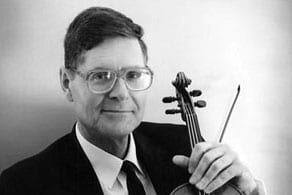 On November 8, 2010 Tyrone Greive—professor of violin at the University of Wisconsin-Madison School of Music and winner in the 1997 PMC Wilk Prize for Research in Polish Music—presented a recital in the UW Faculty Concert Series. The concert celebrated significant birth anniversaries in 2010 of three important Polish composers: Frédéric Chopin – 200 years, Henryk Wieniawski –175 years, Ignacy Jan Paderewski – 150 years. Professor Greive (pictured at right) shared the stage of UW’s Morphy Hall with Ellen Burmeister, piano, and Janet Greive, cello.
On November 8, 2010 Tyrone Greive—professor of violin at the University of Wisconsin-Madison School of Music and winner in the 1997 PMC Wilk Prize for Research in Polish Music—presented a recital in the UW Faculty Concert Series. The concert celebrated significant birth anniversaries in 2010 of three important Polish composers: Frédéric Chopin – 200 years, Henryk Wieniawski –175 years, Ignacy Jan Paderewski – 150 years. Professor Greive (pictured at right) shared the stage of UW’s Morphy Hall with Ellen Burmeister, piano, and Janet Greive, cello.
Included on the program were violin-piano versions of Chopin’s Nocturne, op. 55, no. 2; Mazurka, op. 33, no. 2; and Nocturne, op. 27, no. 2, arranged by famed violinists Jascha Heifetz, Fritz Kreisler and Pablo de Sarasate, respectively. Also on the recital were Wieniawski’s well-known Légende [Legenda], op. 17 from 1859 and Paderewski’s Sonata in A minor, op. 13 for violin and piano from 1885. In addition, the recital included Giuseppe Tartini’s 18th century Piccole Sonate No. 14 in G major for solo violin and cello bass line, and the Sonata for Solo Violin, op. 10, written in 1940 by American composer Vincent Persichetti.
Professor Greive is active as a soloist as well as a musicologist, and a large number of his publications and performances are devoted to Polish music and the violin in Poland. His recent article, “The Appearance of the Violin in Poland and Italian Links to Paths of Polish Royal Patronage,” was published in the summer 2009 issue of the Journal of the Violin Society of America: VSA Papers, Vol. XXII, No. 1. Within the context of significant 16th-century violin-related activity in Poland (especially the “Golden Age” of violin making beginning in the second half of the century), the article examines cultural links between the 16th-century Italian and Polish royal courts and the possibility that they could have facilitated the import of the violin into Poland. Particular attention is given to the Italian born Queen Bona Sforza and her Polish husband King Zygmunt I Stary. See also Prof. Grieve’s article entitled “Kochański’s Collaborative Work as Reflected Through his Manuscript Collection” in the Polish Music Journal, Vol. 1, No. 1.Summer 1998.
 Professors Grieve and Burmeister have also recently produced a recording of significant works for violin and piano by Polish composers across several centuries, entitled “The Polish Tradition” (Albany Records TROY754) – see the December Newsletter for more details.
Professors Grieve and Burmeister have also recently produced a recording of significant works for violin and piano by Polish composers across several centuries, entitled “The Polish Tradition” (Albany Records TROY754) – see the December Newsletter for more details.
[Sources:music.wisc.edu, welltempered.wordpress.com; Photo by Katrin Talbot, Madison Symphony Orchestra]
Stańko – Music For A Good World
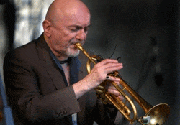 On December 8, 2010, Polish trumpet player Tomasz Stańko and his ensemble gave a special concert “Music for A Good World” at the National Philharmonic in Warsaw. The concert was dedicated to the Museum of the History of Polish Jews, in celebration of the half-way mark in the construction of the Museum. On this occasion, Tomasz Stańko, a renowned jazz trumpeter who is a member of the Polish Committee for Support of the Museum’s Construction, performed with his friends from Poland and the USA: Dominik Wania, Sławomir Kurkiewicz, Craig Taborn and Joey Baron.
On December 8, 2010, Polish trumpet player Tomasz Stańko and his ensemble gave a special concert “Music for A Good World” at the National Philharmonic in Warsaw. The concert was dedicated to the Museum of the History of Polish Jews, in celebration of the half-way mark in the construction of the Museum. On this occasion, Tomasz Stańko, a renowned jazz trumpeter who is a member of the Polish Committee for Support of the Museum’s Construction, performed with his friends from Poland and the USA: Dominik Wania, Sławomir Kurkiewicz, Craig Taborn and Joey Baron.
This is the second concert in the “Music for a Good World” project—in 2009, American violinist Joshua Bell performed at the Grand Theatre in Warsaw. The title of the concert series refers to one of the fundamental concepts of Judaism, namely “tikun olam” or “improving the world,” made popular by Isaac Luria, the 16th century Jewish mystic. The world is not perfect therefore one should strive to make it better through everything one does, in particular education, art, philanthropy and interpersonal dialogue. The concert, held on the day of Hanukah which preceded Christmas, offered a great opportunity to meet and think how we can make the world a better place.
The building housing the Museum of the History of Polish Jews was designed by a Finnish architect, Reiner Mahlamaeki. The construction works of the largest European museum devoted to the Jewish history started on June 30, 2009. Its shell has already been erected to the designed height and has just been roofed. The venue’s characteristic entrance and curvy walls, which will make a sculptural, illuminated and metaphorical space, are already clearly seen. The future rooms have already been outlined, including the permanent exhibition featuring 1000 years of the Jews’ history in Poland, as well as the remaining educational and cultural spaces including a large auditorium, projection, exhibition and workshop rooms, restaurant and a club.
[Source: Polish Press Agency (PAP) via culture.pl]
Anniversaries
Born This Month
- 1 January 1927 – Juliusz LUCIUK, composer, musicologist
- 1 January 1872 – Tadeusz JARECKI, conductor (d. 1955)
- 1 January 1911 – Roman TOTENBERG, violinist and pedagogue
- 2 January 1894 – Artur RODZIŃSKI, conductor, music director (d. 1958)
- 2 January 1907 – Henryk GADOMSKI, composer and conductor (d. 1941, Auschwitz)
- 3 January 1885 – Raoul KOCZALSKI (d. 1948), pianist and composer
- 13 January 1921 – Wanda WILK, founder of the Polish Music Center
- 17 January 1898 – Jerzy LEFELD, pianist and piano professor
- 22 January 1944 – Vincent SKOWRONSKI, violinist
- 23 January 1888 – Jerzy GABLENZ, composer (d. 1937)
- 25 January 1913 – Witold LUTOSŁAWSKI, composer (d. 1994)
- 25 January 1928 – Andrzej CWOJDZINSKI, composer and conductor
- 28 January 1717 – Just Franciszek KASPER, priest, composer, conductor (d. 1760)
- 26 January 1886 – Artur RUBINSTEIN, pianist (d. 1981)
- 31 January 1926 – Stanislaw PRÓSZYNSKI, composer
Died This Month
-
1 January 1953 – Ludomir RÓZYCKI (b. 1884), composer, pianist, member of the group Young Poland
-
9 January 1842 – Józef KROGULSKI (b. 1815), pianist, conductor, voice teacher
-
9 January 1981 – Kazimierz SEROCKI (b. 1922), composer, co-founder of the Warsaw Autumn Festival
-
11 January 1935 – Marcellina SEMBRICH-KOCHAŃSKA (b. 1858), singer – coloratura soprano
-
12 January 1934 – Pawel KOCHAŃSKI (b. 1878), virtuoso violinist, Szymanowski’s collaborator
-
17 January 1969 – Grażyna BACEWICZ (b. 1909), composer, violinist, pianist
-
19 January 1951 – Stanislaw GOLACHOWSKI (b. 1907), musicologist
-
21 January 1618 – Krzystof KRAINSKI [Crainscius], preacher, author of a song collection (b. 1556)
-
23 January 1946 – Feliks NOWOWIEJSKI (b. 1877), composer, conductor, organist
-
23 January 1921- Władysław ŻELEŃSKI, composer (b. 1837)
-
26 January 1946 – Ignacy FRIEDMAN, composer and virtuoso pianist (b. 1882)




